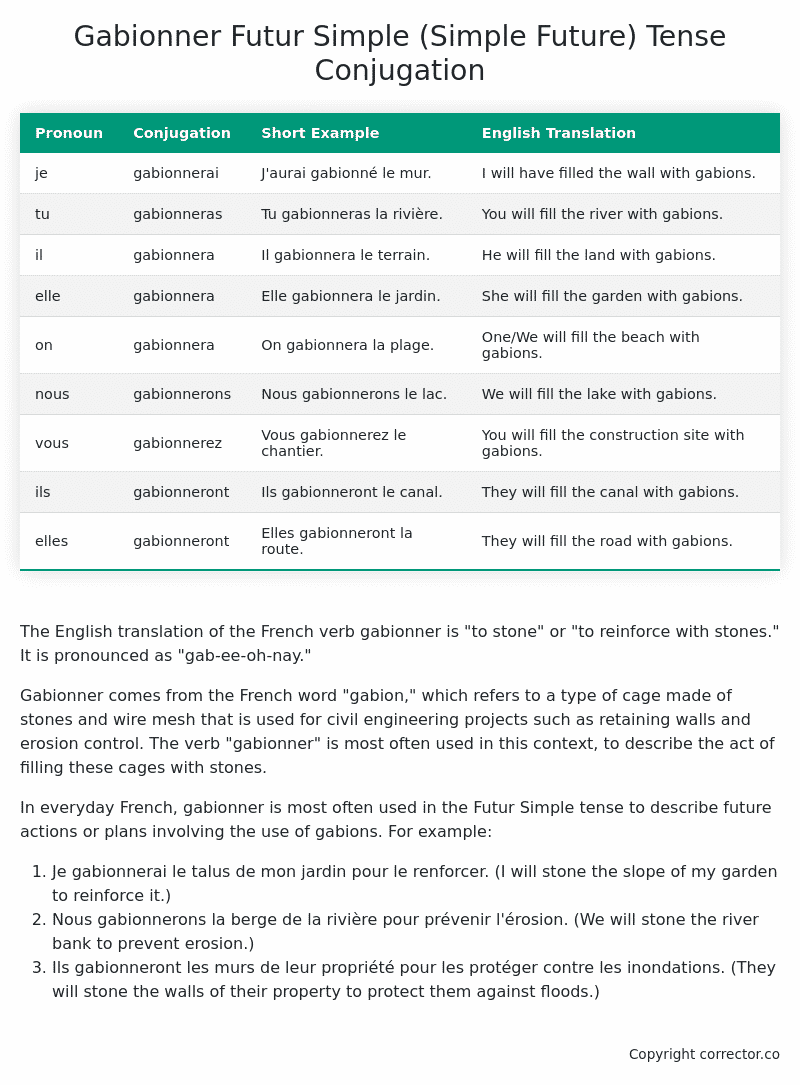Futur Simple (Simple Future) Tense Conjugation of the French Verb gabionner
Introduction to the verb gabionner
The English translation of the French verb gabionner is “to stone” or “to reinforce with stones.” It is pronounced as “gab-ee-oh-nay.”
Gabionner comes from the French word “gabion,” which refers to a type of cage made of stones and wire mesh that is used for civil engineering projects such as retaining walls and erosion control. The verb “gabionner” is most often used in this context, to describe the act of filling these cages with stones.
In everyday French, gabionner is most often used in the Futur Simple tense to describe future actions or plans involving the use of gabions. For example:
- Je gabionnerai le talus de mon jardin pour le renforcer. (I will stone the slope of my garden to reinforce it.)
- Nous gabionnerons la berge de la rivière pour prévenir l’érosion. (We will stone the river bank to prevent erosion.)
- Ils gabionneront les murs de leur propriété pour les protéger contre les inondations. (They will stone the walls of their property to protect them against floods.)
Table of the Futur Simple (Simple Future) Tense Conjugation of gabionner
| Pronoun | Conjugation | Short Example | English Translation |
|---|---|---|---|
| je | gabionnerai | J’aurai gabionné le mur. | I will have filled the wall with gabions. |
| tu | gabionneras | Tu gabionneras la rivière. | You will fill the river with gabions. |
| il | gabionnera | Il gabionnera le terrain. | He will fill the land with gabions. |
| elle | gabionnera | Elle gabionnera le jardin. | She will fill the garden with gabions. |
| on | gabionnera | On gabionnera la plage. | One/We will fill the beach with gabions. |
| nous | gabionnerons | Nous gabionnerons le lac. | We will fill the lake with gabions. |
| vous | gabionnerez | Vous gabionnerez le chantier. | You will fill the construction site with gabions. |
| ils | gabionneront | Ils gabionneront le canal. | They will fill the canal with gabions. |
| elles | gabionneront | Elles gabionneront la route. | They will fill the road with gabions. |
Other Conjugations for Gabionner.
Le Present (Present Tense) Conjugation of the French Verb gabionner
Imparfait (Imperfect) Tense Conjugation of the French Verb gabionner
Passé Simple (Simple Past) Tense Conjugation of the French Verb gabionner
Passé Composé (Present Perfect) Tense Conjugation of the French Verb gabionner
Futur Simple (Simple Future) Tense Conjugation of the French Verb gabionner (this article)
Futur Proche (Near Future) Tense Conjugation of the French Verb gabionner
Plus-que-parfait (Pluperfect) Tense Conjugation of the French Verb gabionner
Passé Antérieur (Past Anterior) Tense Conjugation of the French Verb gabionner
Futur Antérieur (Future Anterior) Tense Conjugation of the French Verb gabionner
Subjonctif Présent (Subjunctive Present) Tense Conjugation of the French Verb gabionner
Subjonctif Passé (Subjunctive Past) Tense Conjugation of the French Verb gabionner
Subjonctif Imparfait (Subjunctive Imperfect) Tense Conjugation of the French Verb gabionner
Subjonctif Plus-que-parfait (Subjunctive Pluperfect) Tense Conjugation of the French Verb gabionner
Conditionnel Présent (Conditional Present) Tense Conjugation of the French Verb gabionner
Conditionnel Passé (Conditional Past) Tense Conjugation of the French Verb gabionner
L’impératif Présent (Imperative Present) Tense Conjugation of the French Verb gabionner
L’infinitif Présent (Infinitive Present) Tense Conjugation of the French Verb gabionner
Struggling with French verbs or the language in general? Why not use our free French Grammar Checker – no registration required!
Get a FREE Download Study Sheet of this Conjugation 🔥
Simply right click the image below, click “save image” and get your free reference for the gabionner Futur Simple tense conjugation!

Gabionner – About the French Futur Simple (Simple Future) Tense
Formation of Futur Simple
For regular -er verbs (e.g., parler – to speak)
For regular -ir verbs (e.g., finir – to finish)
For regular -re verbs (e.g., vendre – to sell)
Common Everyday Usage Patterns
Conditional Statements
Interactions with Other Tenses
Futur Antérieur
Conditional
Present
Summary
I hope you enjoyed this article on the verb gabionner. Still in a learning mood? Check out another TOTALLY random French verb conjugation!


